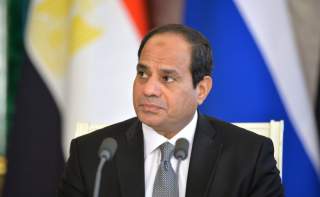Egypt Can't Make Up Its Mind about Iran's Nuclear Program
Cairo’s stance has long been ambiguous.
Ironically, Egypt’s rapid demographic growth has renewed its interest in nuclear energy. Egypt has experienced periods of electricity shortages in recent years, because the Aswan Dam, which once supplied about half of the country’s electric output, now accounts for about 15 percent. In November 2015, Cairo signed an agreement with Russia for a nuclear power plant with four reactors of 1,200 megawatts each, to be located in El Dabaa on the Mediterranean coast. The complex is expected to go online in 2020 and is said to include a water desalination facility. President Sisi emphasized that the facility would be strictly peace-oriented, but some observers noted that it could hide a clandestine program should a decision to proliferate be made. In any event, the recent deal with Russia would make Egypt a regional leader in the field of nuclear technologies boasting a highly advanced generation-3+ plant. As a side benefit, the accord has cemented the growing closeness to Moscow, a premier supplier of nuclear technology and know-how.
Russia and the former Soviet Union also had a role in Egypt’s missile arsenal, which is headquartered in the Jabal Hamza facility. Egypt has a limited number of short-range ballistic missiles, based on Scud-B technology. There are uncorroborated reports that Egypt has some medium-range North Korean Nodong Scud B-100 models. With a range of up to five hundred kilometers, the missiles reflect the localized perception of threats. Egypt’s anti-ballistic defense system encompasses thirty-two American Patriot-3 missiles. As part of its 2014 deal with Russia, Egypt purchased the Bug 2 air-to-air missile and the Antey 2000 (S-300VM) anti-ballistic missile system.
The extent to which these developments could signal a hedging strategy is not clear. Egypt did not sign the Additional Protocol, and is free of other intrusive inspection regimes. But its past history and its leadership of the MENWFZ indicate a lack of interest in proliferation. In spite of its occasionally high-profile rhetoric, Egypt has never launched a sustained nuclear program, civilian or military. This behavior does not comport with the security model of proliferation, but may be explained by Sagan’s observation that some countries do not proliferate despite living in a “rough neighborhood.”
Rather than matching Israel’s arsenal, Egypt chose to engage in the MENWFZ movement, a decision that has colored its response to the JCPOA. The two countries are expected to join forces in launching another appeal to the General Assembly of the United Nations, where the nuclear-free zone idea has a large appeal.
Going beyond the issue of Iran, there has been an increase in concerns that the United States would be unwilling or incapable to guarantee its allies a protective nuclear umbrella. The presumptive Republican nominee for president has suggested that Japan and South Korea would need to fend for themselves. Fear of American abandonment may thus spur a new nuclear race in the Middle East and beyond.
Farhad Rezaei is research fellow at Middle East Institute, Sakarya University, Turkey. He is the author of the forthcoming Iran’s Nuclear Program 1979-2015: A Study in Nuclear Proliferation and Rollback (New York: Palgrave Macmillan, 2016).
Image: Abdel Fattah el-Sisi in Moscow. Kremlin.ru

